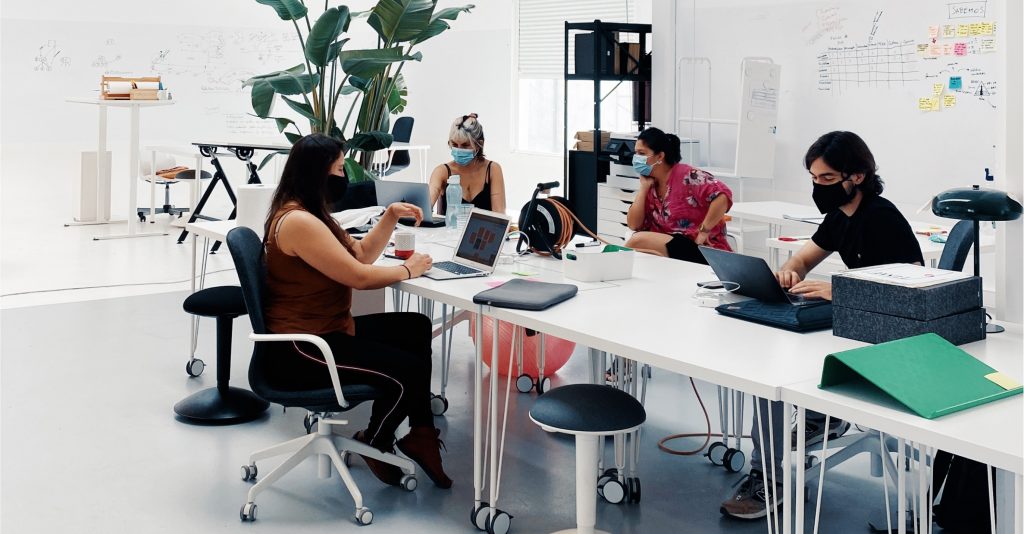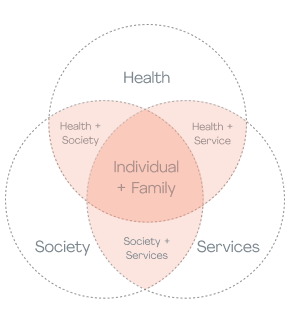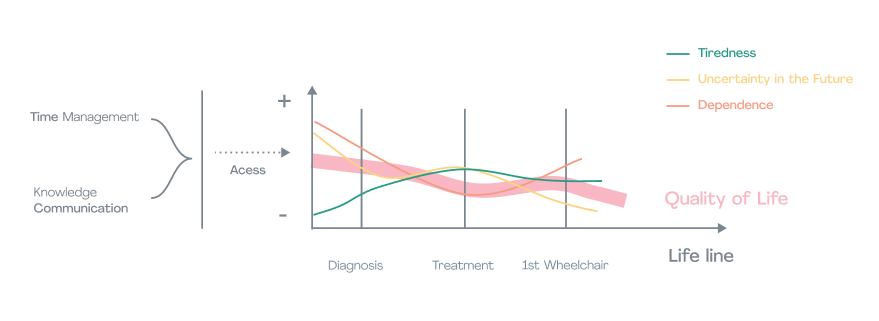Helping patients: beyond treatment
Contextual Research
With Roche
Challenge
To find out how to provide help and support beyond medication to people with a Rare Neuromuscular disease and their safety network.
Outcome
An Ethnographic Study with relevant targets (patients and their families, specialists and medical professionals) to understand their context and the impacts of a Rare Neuromuscular disease in the personal, social, medical and support system (services) dimensions of patients and their families.
- Client
- Roche
- Service
- Contextual Research
- Location
- Portugal
- Duration
- 4 months
- fields
- Strategy, Research, Medical, Pharmaceutical
- team
- Ana Oliveira, Tiago Nunes,
Illa Branco
Juliana Lubianca
,Manuel Soares
,Natalie Pacheco

context
Before entering new therapeutic areas, it’s important to deeper the understanding of one disease from the patients’ perspective. While treatments are being developed and before they are launched in the future, Roche aims to know the reality and impact of this disease.
our role
Translate the challenges of the everyday routine to reach opportunities for the improvement of their quality of life and independence.
01
Desk research to understand the medical and social context, especially in other countries.
02
Empathetic facilitators within the network by building bridges between patients, doctors, families and other stakeholders.
03
Deep dive in the community through interviews, day-to-day diaries, workshops, participative and non-participatory observations.
Goal
Map opportunities, translate challenges and provide updated references of solutions to improve patients’ quality of life and independence.
RESEARCH AND FINDINGS
Search for scientific and non-scientific information about the medical context of the disease, the international community around it – especially on Social Media, and Benchmark of support services and stakeholders.
23 in-depth interviews and conversations with patients, close family, teachers, employers, doctors and social advocates that allowed us to have a deep understanding of the challenges these people face every day, from the moment of diagnosis to, for example, finding a job or even death.
Whatsapp diaries with 7 families and caregivers for a week. These diaries were a way of following these families on everyday tasks and routines, opening the door to their lives.

A workshop with the parents of younger patients, that opened a fruitful and sensitive discussion about the way society, medical and support services are not accessible for these families. It was a way for the team to verify findings and learn new insights on specific topics, through a group conversation.
After visiting three cities in Portugal – Porto, Viseu and Guimarães – the team had the chance to participate in 5 moments of the daily life of patients and caregivers. We observed their daily lives at home, at work and at leisure.

After the research project, With Company provided a Psychodrama Session to help the Research Team process all the sensible information of the project and its impact on their personal and professional life.


Being independent is not about being able to do everything alone, it is about learning how to be dependent, knowing how to ask for help.
RESULts


Disease Dimension
We started from the disease, the clinical context, the available treatments and how far science has gone.
Services Dimension
We understood how the world was structured around this disease. The specialities and types of support linked to this pathology.
Social Dimension
We entered the emotional, psychological and symbolic spheres. For this, we have expanded our scope to include PEOPLE.
Personal Dimension
The centre of these intersections represents the most important thing of the entire universe of study, the individual and his family.
- The quality of life of these people often depends on the goodwill of intermediaries;
- The world is not designed from an inclusive perspective. Instead, the mindset is to adapt to each need, not foresee it;
- The family is one of the main factors determining how these people will face life and the challenges that only grow with time;
- The patient's daily activities are defined by the level of tiredness they and their families face. In this sense, tiredness acts like a measurer, a criterion to determine what actions will happen and how;
- The health system needs to be more articulated to provide multidisciplinary and integrated care, where parents do not get burdened with managing and making decisions outside their scope;
- Access is the result of time management and how knowledge reaches families and patients. In turn, the level of access, whether to services, medicines, etc., influences the key remaining factors in these people's lives, thus directly influencing their quality of life. Less access at the time of diagnosis, for example, means less quality of life, as it increases fatigue, uncertainty about the future and dependence.















